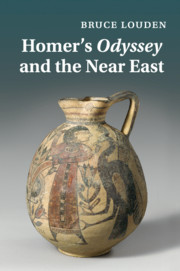Book contents
- Frontmatter
- Contents
- Acknowledgements
- Introduction
- 1 Divine councils and apocalyptic myth
- 2 Theoxeny
- 3 Romance
- 4 Odyssey 4
- 5 Odyssey 5
- 6 Odyssey 6–8, 10–12, 13.1–187; Genesis 28–33; Argonautic myth
- 7 Odysseus and Jonah
- 8 The combat myth
- 9 Catabasis, consultation, and the vision
- 10 Thrinakia and Exodus 32: Odysseus and Moses
- 11 The suitors and the depiction of impious men in wisdom literature
- 12 Odysseus and Jesus
- 13 Contained apocalypse
- Conclusion
- Bibliography
- Index locorum
- Subject index
10 - Thrinakia and Exodus 32: Odysseus and Moses
The people disobey their leader and rebel against god
Published online by Cambridge University Press: 04 February 2011
- Frontmatter
- Contents
- Acknowledgements
- Introduction
- 1 Divine councils and apocalyptic myth
- 2 Theoxeny
- 3 Romance
- 4 Odyssey 4
- 5 Odyssey 5
- 6 Odyssey 6–8, 10–12, 13.1–187; Genesis 28–33; Argonautic myth
- 7 Odysseus and Jonah
- 8 The combat myth
- 9 Catabasis, consultation, and the vision
- 10 Thrinakia and Exodus 32: Odysseus and Moses
- 11 The suitors and the depiction of impious men in wisdom literature
- 12 Odysseus and Jesus
- 13 Contained apocalypse
- Conclusion
- Bibliography
- Index locorum
- Subject index
Summary
The crew's rebellion on Thrinakia is the final episode and climax of Odysseus' wanderings as he narrates them to the Phaiakians. The only incident mentioned in the proem, a sign of its climactic nature and function, at its conclusion Odysseus is the only surviving member of his once large crew. To depict these key events the Odyssey employs a genre of myth also extant in the Old Testament, the Israelites' rebellion against Moses and Yahweh in Exodus 32. We can initially characterize the two myths' common ground as follows. While in the middle of an arduous journey that takes years, the followers of a leader, who has a personal relationship with god, chafe at being delayed for a month in the same place, unable to continue the journey toward their long sought goal. In his absence, while he communicates with god, they violate a god's commandment, and perform a perverse religious ritual, offending the god. They die as a result of the subsequent divine wrath, but a divine council mediates the wrathful god's anger preventing him from causing even greater destruction. The leader, who had no part in the disobedience, is spared. Specific parallels exist between Odysseus and Moses as leaders, between the crew and those Israelites who rebel, between Eurylochos and Aaron as leaders of the rebellion and inappropriate rituals, between Helios and Yahweh in their divine wraths against the rebels, and between Zeus and Moses (!) in their successful mediations in divine councils with the wrathful Helios and Yahweh.
- Type
- Chapter
- Information
- Homer's Odyssey and the Near East , pp. 222 - 243Publisher: Cambridge University PressPrint publication year: 2011



